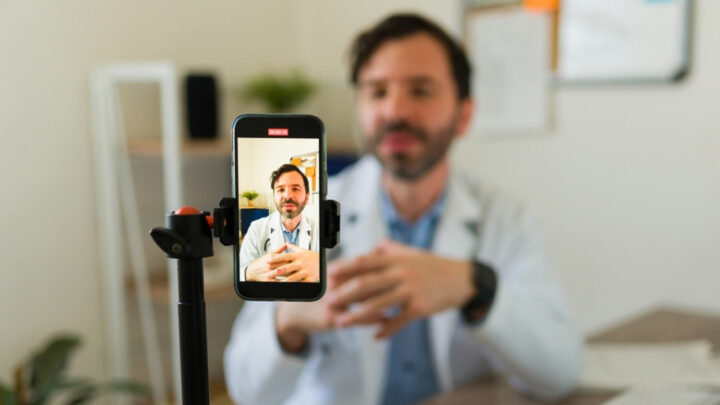
In a recent Sermo poll, 86% of physicians said a key opinion leader’s (KOL’s) credibility depends on their professional credentials, experience, or recommendations from peers. Just 10% felt that the quality of their content was the most important factor.1
That disconnect raises a question: how should physicians evaluate KOLs when authority often outweighs content quality in perceived credibility?
It’s a valid concern. In the USA, more than 141,000 healthcare professionals (HCPs) have worked as paid speakers for pharmaceutical companies.2 While these partnerships can raise concerns about impartiality, they also help disseminate new medical knowledge and clinical trial data.
If the content KOLs make varies in quality, but all of it is still widely consumed by practicing HCPs, is this now an era of influence without scrutiny?
This article draws on Sermo poll data and insights from physician members, examining how KOLs are viewed by their peers. We’ll look at how their content is received, how it influences clinical practice and whether credibility is still being earned or simply assumed.
Who are key opinion leaders in healthcare and why do they matter?
KOLs in healthcare are high-profile experts who shape medical practices through their expertise, research and reach. They could be physicians, academic researchers, hospital executives or patient advocates.3 What they all have in common is the ability to advocate for new ideas and influence the thinking of their healthcare professional peers.
As one Sermo member and GP put it: “There are many resources, but I prefer to have direct contact with people with years of experience.4”
This preference reflects a broader industry trend. The medical KOL management market is valued at USD 65.06 billion as of 2025 and expected to more than triple to USD 211.27 billion by 2032.5 This massive expansion is a sign that healthcare organizations and pharmaceutical companies are increasingly seeing KOLs as an opportunity to shape conversations and decisions.
Yet, with that greater reach comes greater responsibility, and when KOLs in pharma get it wrong, the fallout can be severe. A prominent historical lesson is the promotion of Vioxx (rofecoxib). This was a Merck-developed painkiller supported by prominent medical voices before being pulled from the market in 2004 due to a link to increased cardiovascular risk.6 In this instance, the influence of those voices helped drive an uptake of the drug and delayed scrutiny.7
In a digital age, where content travels fast and influence is monetized, the ability to critically assess a KOL’s credibility has never been more important.
What makes a medical key opinion leader credible?
According to a Sermo poll, physicians believe the top factors for KOL medical credibility are:
- 48% – Professional credentials
- 21% – Years of experience
- 17% – Peer recommendations
- 10% – Quality of content
- 0% – Social media following or engagement1
These figures point to a kind of self-governance through trust in professional hierarchy and peer validation. As one GP on Sermo noted: “[We must] assess influencers’ qualifications, experience and expertise in healthcare. Physicians, nurses, nutritionists and industry professionals often bring credibility due to their firsthand experience.4”
However, this set of results is also counterintuitive. If content quality is only a minor factor in determining credibility, there’s a risk that influence is conferred based on reputation alone. This situation could create the opportunity for misinformation, bias or even political and commercial agendas to slip through unchallenged.
This is especially concerning given that none of the Sermo survey respondents considered social media engagement a marker of trust. It suggests that while platforms like TikTok or LinkedIn give KOLs new reach, the medical community remains skeptical of digital popularity as a proxy for expertise.
How do physicians engage with KOL content?
Physicians are engaging with key opinion leader (KOL) content more frequently and across a wider range of formats than ever before. Sermo poll answers say 44% of physicians engage with KOL content several times a week, with another 36% doing so weekly or bi-weekly.1 This shows that KOLs are now a regular, possibly even essential, source of professional input.
When asked about the most valuable content formats, 38% of physicians preferred short-form videos, followed by detailed articles (19%), webinars (19%), podcasts (12%) and case studies (4%).1
The popularity of short-form video content, which is likely inspired by platforms such as TikTok, Instagram Reels and YouTube Shorts, suggests that physicians value speed and accessibility. However, there’s now a risk that these short, bite-sized formats may sacrifice depth for accessibility, particularly on complex medical topics. On these platforms, it can be difficult to assess whether the information is unbiased, complete or potentially even influenced by commercial or political motives.
That said, the fact that detailed articles rank second indicates that many physicians still turn to rigorous, evidence-based formats for deeper learning. This balance suggests that HCPs remain a discerning audience, one that appreciates quick insights but still values substance.
When asked what matters most in KOL content, 29% of physicians on Sermo cited accuracy and 17% pointed to relevance.1 This underscores the importance of trust. As one Sermo GP noted: “Factors that boost credibility include medical expertise, research experience and professional certifications.4” While physicians still seek familiar names, they also look for content that’s clinically proven and relevant to their area of expertise.
Given the frequency with which HCPs engage with social content, even a single misleading post can carry outsized influence. Therefore, to maintain their credibility, KOLs should consistently prioritize accuracy, objectivity and clinical relevance, and HCPs should continue to demand this from them.
Physicians weigh in: Are KOLs driving clinical decision-making and choices?
Key opinion leaders (KOLs) play a significant role in shaping how physicians explore new ideas, but not necessarily how they make final clinical decisions. According to a Sermo poll, 38% of physicians say updates on new medications inspire them to conduct further research, while 21% value clinical trial results or personal experiences. Yet, only 8% say expert opinions directly influence their decisions.1
This suggests that KOLs function more as inspiration for further research rather than the final voice on a matter. Their influence shows itself in ways such as raising awareness and encouraging engagement, rather than dictating precise treatments. This is reassuring for their credibility because it shows that most physicians are doing their due diligence rather than following endorsements at face value.
While 48% of physicians cite professional credentials as the top credibility factor,1 it’s clear that evidence still matters most. The Sermo poll results suggest the influence of KOLs is:
- Exploratory and prompts investigation
- Supportive to provide extra information to relevant but nuanced healthcare matters
- Provides background to offer guidance and possible ways forward, but not exact methodologies
Hence, the KOLs that remain consistently impactful are those who present solid research, contextualize it with experience and prompt independent thinking – not those who dictate or simply just accept the status quo.
How can physicians engage with KOLs in the future – will there be rising trust or growing skepticism?
According to Sermo data:
- 42% of physicians believe the influence of KOLs is a mix of both benefits and challenges
- Professional credentials remain the top credibility factor
- The future of KOL’s influence depends on whether the content they produce is unbiased and evidence-based to offer insight1
The trust physicians have in KOL doctors must be earned and maintained. In an era of misinformation and commercial partnerships, blind trust is fading. Physicians want to ensure the ethics of the content they consume through transparency, accuracy and clinical utility.
As one GP on Sermo noted: “To build trust, healthcare influencers should disclose potential conflicts, share evidence-based information and engage respectfully online.4”
Given that this is what their peer followers are looking for within their content, a KOL’s success will depend on their ability to:
- Be transparent about sponsorships and affiliations
- Present the pros and cons of therapies
- Encourage discussion rather than dictate the conclusions
How should KOL content be vetted? (3 quick tips)
- Check for disclosures and conflicts of interest.
- Look for peer-reviewed contributions, not just promotional material.
- Balance KOL advice with your own clinical judgement and trusted guidelines.
Ultimately, whether you follow KOLs closely or with caution, staying informed and critically engaged ensures that your clinical decisions remain evidence-based.
Your takeaway
With the rise in the number of KOLs, their ability to continue having influence will depend on their ability to stand up to increased scrutiny, and the quality for which their followers hold them accountable.
Ultimately, the strength of the medical profession lies in its ability to self-regulate. Physicians trust each other not because of fame, but because of shared standards. As a GP on Sermo, puts it: “What makes healthcare influencers credible is trust. Most people have much respect for HCPs because the work generally, was built on trust and the oath taken.4”
That ethos of mutual respect, diligence and trust is what will continue to guide how physicians choose their KOLs and how KOLs earn their place in the medical conversation.
Footnotes
- Sermo, 2024. Poll of the Week: Mastering the “influencer” game in healthcare marketing [Poll]. Sermo Community.
- Sismondo S. How to make opinion leaders and influence people. CMAJ. 2015 Jul 6;187(10):759–60. doi: 10.1503/cmaj.150032. Epub ahead of print. PMID: 26149703; PMCID: PMC4500705.
- Kendle Healthcare, 2024. KOLs in pharma: What are they and why do they matter?
- Sermo member, 2024. Comment on Poll of the Week: Mastering the “influencer” game in healthcare marketing [Poll]. Sermo Community [Private online forum]
- GlobeNewswire, 2024. Global Key Opinion Leader Management Market set to grow at 12.5% CAGR, surpassing USD 211.27 billion by 2032 amid increasing demand – FMI.
- Vioxx: an unequal partnership between safety and efficacy, The Lancet, The Lancet, Volume 364, Issue 9442, 1287 – 1288
- Krumholz HM, Ross JS, Presler AH, Egilman DS. What have we learnt from Vioxx? BMJ. 2007 Jan 20;334(7585):120-3. doi: 10.1136/bmj.39024.487720.68. PMID: 17235089; PMCID: PMC1779871.















